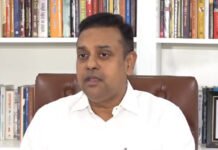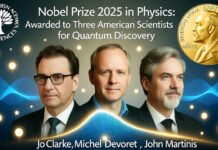Nobel Prize 2025: Nobel Prize in Physics Awarded to Three American Scientists
The Nobel Prize in Physics 2025 has been awarded to John Clarke, Michel H. Devoret, and John M. Martinis, all three of whom are American scientists. The Royal Swedish Academy of Sciences made the announcement on Tuesday, recognizing their groundbreaking discoveries in large-scale quantum tunneling and energy quantization in electrical circuits.
The academy stated that the Nobel laureates were honored for their “discovery of macroscopic quantum mechanical tunneling and energy quantization in electric circuits,” a significant leap toward demonstrating quantum phenomena on a large scale. Their work bridges the gap between theoretical quantum mechanics and practical electrical systems.
The winners represent some of the most prestigious American universities: John Clarke is affiliated with the University of California, Berkeley, Michel H. Devoret is from Yale University, and John M. Martinis is from the University of California, Santa Barbara.
Each laureate will receive 11 million Swedish krona (approximately ₹10.3 crore), along with a gold medal and a certificate. The formal Nobel Prize award ceremony will take place in Stockholm on December 10, marking the anniversary of Alfred Nobel’s death.
Between 1901 and 2024, a total of 226 Nobel laureates have received the Physics award across 118 editions. Alfred Nobel, the Swedish industrialist and inventor of dynamite, founded the Nobel Prizes to honor those who contribute most to humanity in the fields of physics, chemistry, medicine, literature, and peace.
Previous Year’s Nobel Prize in Physics
In 2024, the Nobel Prize in Physics was awarded to John J. Hopfield and Geoffrey Hinton for their revolutionary work applying physics principles to machine learning. Hopfield developed the Hopfield Network, which allows computers to recognize and recall patterns, while Hinton — known as the “Godfather of Artificial Intelligence” — created the Boltzmann Machine, a foundational model for deep learning systems.
















